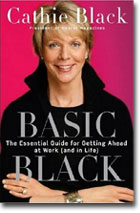Books |
Basic Black: The Essential Guide for Getting Ahead at Work (and in Life)
Cathie Black
By
Published: Jan 01, 2007
Category:
Self Help
Many people who are unhappy with their jobs or just eager to move up have used company time to work on their résumés. And they’ve probably gone on to photocopy those résumés on the office machine. And some of them have almost certainly left the original at the copier, where, as luck would have it, it gets found by a senior executive who knows exactly what it means.
Cathie Black did all that.
The difference between her and the yutz who regales his friends with his stupidity over brewskis at the corner tap is that Cathie Black is the CEO of Hearst Magazines — and that she tells this story on herself at the start of her book.
Right away you know: This is not a woman who has airbrushed her career.
I can personally testify to that. Over the years, I have spoken at Hearst conferences and flirted with employment at Hearst, and my conversations with Cathie Black have been models of clear communication. She states her position or asks her question, listens attentively, and follows up — she’s the walking example of a “New York minute.” But she’s not a chilly corporate nun. She gets the joke: Magazines may help you better your life, they may divert you from your cares, they may even help you figure out how to dispose of your disposable income, but they do not cure cancer. And so, when I picture Cathie Black, I think equally of her blunt-as-a-bullet approach to business and her quick, warm laugh.
Those qualities come through in this book, which is, above all, a virtual mentoring campaign. That benevolent sharing is crucial, for Black believes every woman who hopes for a successful, rewarding career needs a mentor. If you happen to lack a powerful woman with a generous heart, look no further — Cathie Black is not one of those people who got to the top and promptly set about making sure no one else could follow her route.
Nor is Cathie Black some sort of doctrinaire feminist — though she was at Ms. Magazine in the years when it was more or less assumed that its employees burned their bras and braided their underarm hair. Great CEOs have no politics, they’ll vote for whatever works. And Cathie Black is a great CEO; in her decade at Hearst, she’s presided over 10% growth, scored the most successful magazine launch in history (the Oprah magazine, O) and power-wedged a once-glacial company onto the Web.
So her advice is practical in the extreme. Think of your boss as “a small woodland animal” — you don’t want to surprise him/her with any sudden moves. Better that you should anticipate his/her needs. Better that you make him/her look good. Does that grate on you? Always remember: “The end game is the only game in town.” Translation: Don’t play for small stakes.
This simple advice is worth the price of admission. If you spend your days in the kind of offices I’ve had the misfortune to work in, you are surrounded by politicians who think the election is tomorrow. They’re catty and petty; they think small. Join them, and you’ll never get beyond middle management.
Happily for those of us who are sick to death of how-to tomes written by people who couldn’t do it if they memorized their own books, Basic Black dares to suggest an idea you rarely hear: Smart Thinking and Right Conduct do get rewarded in the real world.
Examples:
When you’ve prepared for a meeting with the big boss, do you present your pitch, no matter what he/she signals? Cathie Black listened carefully, then threw an hour speech out the window and got everything she needed — from Rupert Murdoch, no less — is just five minutes.
When you’re wooing Oprah, do you hire Spielberg to make a promo film about your company? Black’s crew took digital mini-cams to the mall.
When you’re offered a job with your dream title, do you jump at it — even if it means a move to Podunk? Cathie Black almost did. Fortunately, she had a mentor who spoke fluent Reality.
The blend of memoir, self-help guide and mentoring session in “Basic Black” has a powerful effect: It’s impossible to read this book without entering into a conversation with it. Would you do what Black did? What would Black do in your situation? There’s really no such thing as a virtual mentor. And self-help books can’t really help you run your life better. But a book that presents situations and challenges you to second-guess the author’s decisions — that’s a useful book.
If I were young and female and buffeted on all sides by gurus who promise the impossible, I’m sure I’d find “Basic Black” a comfort and a prod — an intimate chat with a kindly aunt who tells you how she succeeded, then kicks your butt and tells you to strap on your Manolos, get out there and make something of yourself.
Yes, Ms. Black! Of course, Ms. Black! Right on it, Ms. Black!
And then, if her way works for you: Thank you, Ms. Black!


